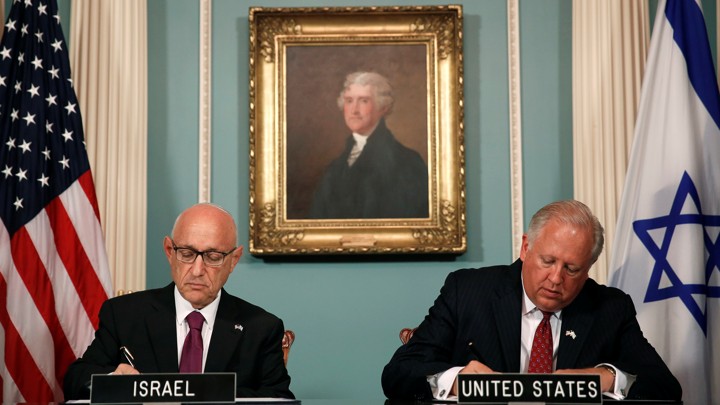|
‘Poor Little Israel’ Isn’t So Poor, Financially or DiplomaticallyWayne Madsen – Strategic Culture Oct 19, 2019
One of the tropes Israel and its international phalanx of lobbyists has used since the state’s inception in 1948 is that “Poor Little Israel” requires Western money and diplomatic support because the small country is surrounded by hostile Arab countries. Neither of these contentions have ever been true.
On August 7, 2019, the US Congressional Research Service (CRS) reported that Israel has been the largest recipient of cumulative assistance since World War II. In current non-inflation-adjusted dollars, Israel has received a total of $142.3 billion in US bilateral assistance and defense funding. Most of the US government assistance has been military in nature.
In addition to US assistance, Israel Bonds, sold through the Development Corporation for Israel (DCI), which is headquartered in New York, have seen $40 billion in sales, with $1.2 billion in annual sales being reached in 2013, a record for annual sales. The $1 billion mark was also reached in 2014 and 2015. One of the reasons behind the global Boycott, Divestment, and Sanctions (BDS) program to disinvest in Israel in retaliation for their treatment of the Palestinian people, is the fact that 90 US states and municipalities, in addition to labor unions, corporations, universities, and foundations, have invested their pension and treasury funds in the DCI.
Israel has also received billions of dollars in loan guarantees from the United States. The CRS report states that these guarantees have boosted the country’s “fiscal standing among international creditors in capital markets.” The US Congress is set to pass a bill that authorized $3.8 billion in US loan guarantees to Israel through Fiscal Year 2023.
Between 1973 and 1991, the US State Department’s Migration and Refugee Assistance account (MRA) provided $460 million to the private foundation, United Jewish Appeal (UPA) to resettle Jewish refugees in Israel. Many of these so-called “refugees” were from the Soviet Union and their “stay” in Israel was rather short. Many of them re-emigrated from Israel to the United States, where they enjoyed the freedom to engage in criminal enterprises centered mainly in Brighton Beach in Brooklyn, New York (nicknamed “Little Odessa”); Miami and Palm Beach; Florida; Newark and Atlantic City, New Jersey; Los Angeles, California; and Las Vegas, Nevada. A number of these refugees-turned-gangsters invested heavily in the Trump Organization’s residential properties in Manhattan; Sunny Isles Beach, north of Miami; Las Vegas; Phoenix, Arizona; Panama City, Panama; Toronto, Canada; Punta del Este, Uruguay; as well as Trump casinos in Atlantic City. The effects of these investments by what is alternately called by the US Federal Bureau of Information the “Organizatsiya,” “Eurasian Mafia,” and “Red Mafiya,” and, more informally and in very hushed tones, the “Kosher Nostra,” has plagued the Trump administration and contributed to its many scandals.
The recent arrest at Dulles International Airport of Lev Parnas and Igor Fruman, two Miami-based Organizatsiya players, on federal election law violations is merely the latest in a string of such law enforcement actions. The latest arrest involves Trump’s personal attorney, Rudolph Giuliani, who, as the US Attorney for the Southern District of New York (SDNY), brought criminal charges against and convictions of the leaders of the five Italian Mafia crime families in New York (Genovese, Gambino, Lucchese, Colombo, and Bonanno). Giuliani, as mayor of New York City, permitted the Organizatsiya crime families of Brooklyn to flourish in the absence of the Italian mob. Today, these crime figures travel freely between the United States and Israel, the latter having become a central cog in global black market, money laundering, and smuggling operations. It is Israel’s sanctioning of criminal activities that has directly led to it being one of the world’s wealthiest countries.
Critics of taxpayer-funded US military assistance to Israel point out that the Israelis are currently a major exporter of military systems to other countries, which include some of the so-called “hostile Arab nations” that surround Israel. Israel’s sizable domestic military industry has netted sales of missile defense systems, unmanned aerial vehicles, cyber security products, radar, and electronic communications systems to the United Arab Emirates and Saudi Arabia, in addition to India, Azerbaijan, Vietnam, Thailand, South Korea, Singapore, Philippines, Australia, France, Germany, Italy, Russia, Brazil, and the United States.
The CRS report also includes information on increasing military ties between Israel and China. These growing ties have alarmed the US Navy, which has previously made port calls at the Israeli naval base in Ashdod on the Mediterranean coast. According to the report: “. . . a state-owned Chinese company (the Shanghai International Port Group) has secured the contract to operate a new terminal at Haifa’s seaport for 25 years (beginning in 2021), and another state-owned Chinese company (a subsidiary of China Harbor Engineering Company) is developing Ashdod’s new port. Both Haifa and Ashdod host Israeli naval bases. Due to the Chinese contract for Haifa, the US Navy is reportedly reconsidering its practice of periodically docking at the base there.” Considering the close ties between Donald Trump and his son-in-law, Jared Kushner, to Israeli Prime Minister Binyamin Netanyahu, it is likely that the US Navy’s objections to sharing port facilities with Chinese construction crews with be vetoed by the White House.
Israel’s status of a small country fending off hostile moves by surrounding Arab and Muslim nations beggars belief. Israel maintains close relations with Egypt, with which it has maintained diplomatic ties since 1979. Israel and Egypt jointly engage in military operations directed against jihadist groups in the Sinai Peninsula, as well as restricting access to the Gaza Strip. Israel also maintains diplomatic relations with Jordan. Low level non-diplomatic relations also exist between Israel and Bahrain (with which Israel has an intelligence-sharing relationship), Iraqi Kurdistan, Morocco, Saudi Arabia (with which Israel has an agreement to stockpile military supplies in forward operating locations in the event of a joint Israeli-Saudi-UAE attack on Iran), Oman; Djibouti; the United Arab Emirates (where Israel maintains a non-diplomatic office in Abu Dhabi), the Tobruk-based government of Libyan warlord General Khalifa Haftar; and the exiled government of Yemen, which is based in Riyadh. Previous non-diplomatic relations between Israel and Lebanon, Turkey, Mauritania, Maldives, Qatar and Tunisia were frozen as a result of Israeli military actions against the Palestinians and other issues. Full diplomatic relations exist between Israel and such Muslim nations as Kazakhstan, Turkmenistan, and Azerbaijan. Israel also maintains low-level non-diplomatic and trade relations with non-Arab Muslim nations, including Afghanistan, Indonesia, and Malaysia. There are various reports of Israeli diplomats having paid covert visits to Somalia and the self-declared Somaliland.
Israel’s closer relationship with Saudi Arabia should put to rest the notion of Israel being surrounded by hostile countries. There are credible news reports that Israel has been selling the Saudis advanced military drones via South Africa. It has also been credibly reported that Israel’s Mossad and the Saudi General Intelligence Directorate (GID) maintain direct links and that Mossad facilitated the provision of the Pegasus mobile phone tracking software, manufactured by the Herzliya-based NSO Group, to the GID. Pegasus was allegedly used by GID in its murder of US-based journalist Jamal Khashoggi in Istanbul in October 2018. Israel and the UAE and Bahrain also apparently pooled their intelligence resources to ensure a Trump administration withdrawal from the Joint Comprehensive Plan of Action (JCPOA) – the nuclear agreement with Iran – and a multinational embargo instituted against Qatar.
Today, “Poor Little Israel” exercises de facto superpower influence over its own region and long-reach diplomatic power over nations as far away as the Marshall Islands, Vanuatu, and Nauru in the South Pacific
Click on this text to watch: Endless Wars and How Much Israel Costs You? Israel will get far more than $38 billion under the new deal
A stack of 3.8 billion dollar bills would reach the International Space Station. The new package to Israel will give Israel ten times that much money. An Israeli official gloated that the package was obtained “despite budget cuts, including defense cuts, in the U.S.”
In an unprecedented gift of our executive power to Israel, the House has passed for the very first time a law that forces the American president to give Israel a minimum of $3.8 billion per year. We have, in effect, crippled our ability to promote US interests in the Middle East. The new House version is even more generous to Israel than the Senate bill and the 2016 MOU… it amounts to $7,230 per minute to Israel, or $120 per second…By Nicole Feied
The AIPAC sponsored bill that guarantees $38 billion to Israel over the next ten years is a dramatic departure from the deal offered under President Obama’s 2016 Memorandum of Understanding (MOU).[1] Passed by the House of Representatives on September 12, 2018, the United States-Israel Security Assistance Authorization Act of 2018 effectively rolls back every limitation that President Obama placed on the amount of aid we give to Israel.
In addition, the House version provides Israel even more perks than the version passed by the Senate on August 11.
Most dramatically, this new act would eviscerate the ability of President Trump and his successors for the next ten years to withhold United States aid to Israel. Historically, almost every president since Eisenhower has attempted to withhold such aid at one time or another in order to force Israel to the peace table or to stop Israel from committing human right abuses or illegal acts such as taking Palestinian land and giving it to Israeli settlers.
In an unprecedented gift of our executive power to Israel, the House has passed for the very first time a law that forces the American president to give Israel a minimum of $3.8 billion per year. We have, in effect, crippled our ability to promote US interests in the Middle East.
President Eisenhower was the last American President who managed to use this threat effectively, when he forced Israel to withdraw from Egypt’s Sinai Peninsula in 1957.
Notably, President George Bush Senior failed miserably to make good on his threat to delay aid to Israel when their actions threatened a possible peace agreement with the neighboring Arab countries, complaining that he was “just one little lonely guy” in his battle against pro-Israel lobbyists. (New York Times, 1991 article, “Bush Urges Delay On Aid For Israel; Threatens A Veto.”)
Aid to Israel likely to increase even more
The second most important effect of this act is in Section 103. While the MOU limits the amount of aid we give Israel to the amount agreed upon, in this case $38 billion over 10 years, Section 103 of the current bill removes all limitations on how much we give Israel. Under the new act, instead of 38 billion being the cap, as Obama stipulated in his 2016 MOU, we must now give Israel a minimum of $3.8 billion per year until 2028.
Without a cap, and with incessant lobbying by Israel and her proxies in the United States, the amount we give could conceivably double over the next 10 years. This is a huge coup for Prime Minister Netanyahu and quite a slap in the face to the Obama administration.
Section 106 will increase Israel’s access to a war-reserve stockpile by completely removing the limits on how many precision guided missiles we can give Israel. The existing law set a maximum of $200 million worth of arms from the stockpile per year, to be charged against the agreed aid package.
The House version of the bill differs from the Senate version, replacing the words “sell” and “sale” to “transfer,” which appears to open the door for more gifts in excess of the $38 billion. To put this in context, a Tomahawk Missile currently costs about $1 million. The media recently lambasted President Trump for using 60 such missiles in Syria because of the high cost.
Section 107 calls on the President to prescribe procedures for the rapid acquisition and deployment of precision guided munitions. The House text differs from the Senate version in that it removes all the detailed requirements for Israel to have such rapid acquisition. In the version just passed by the House, there is only one, extremely broad requirement, that Israel is under direct threat of missiles (in Israel’s opinion).
Israel can export U.S. arms
Section 108 of the Act authorizes Israel to export arms it receives from the U.S., even though this violates U.S. law. The Senate version included a provision calling on the President to make an assessment of Israel’s eligibility before adding Israel to the exemption list.
The House version deleted that requirement, and simply orders the American President to grant Israel the privilege. In fact, Israel is ineligible, having repeatedly made unauthorized sales in violation of this Act. The Export Act further forbids granting such an exemption to any country that is in violation of International Nuclear Non-proliferation Agreement, which Israel has refused to sign. Israel is known to be in possession of nuclear weapons, and hence in violation and ineligible for the export exemption. Congress thus reiterates the message that it will force the President to continue funding Israel even when that violates our laws.
NASA
Section 201 orders NASA to work with the Israel Space Agency, even though an Israeli space official has been accused of illegally obtaining classified scientific technology from a NASA research project. U.S. agencies periodically name Israel as a top espionage threat against the United States. The section also states that United States Agency for International Development (USAID) must partner with Israel in “a wide variety of sectors, including energy, agriculture and food security, democracy, human rights and governance, economic growth and trade, education, environment, global health, and water and sanitation.”
Israel eludes usual military aid requirement
All countries except Israel are required to spend US military aid on American goods. This ensures that the American economy benefits to some degree from these massive gifts. (Of course, if americans wished to subsidize these U.S. companies, money could be provided directly to them, and Israel and other countries left to buy their equipment with their own money.)
In the past, Israel has spent 40 percent of U.S. aid on Israeli companies, at the expense of U.S. industry. Under Obama’s 2016 MOU, this percentage was to be decreased over the 10-year span, and eventually Israel’s unique right not to spend use U.S. military aid to purchase items from American companies was to be ended. The new Act eliminates this requirement, putting Israeli economic interests before our own.
Many in Israel criticized Prime Minister Netanyahu for his aggressive attempts to undermine President Obama’s Iran deal, fearing that it would anger the White House and result in a less favorable aid offer. Analysts were particularly worried about what might happen if Trump were elected, since in 2016 he had said that he expected Israel to pay back the security assistance it receives from the US.
Yet just two years later it looks like the Israeli Prime Minister will obtain everything he sought and more. This is not surprising, since Trump, under extreme political pressure, is increasingly pandering to hardcore Israel supporters like billionaire Sheldon Adelson and South Carolina Senator Lindsay Graham. (Graham is a top recipient of pro-Israel campaign donations.[2])
 Sheldon
Adelson is known as the casino mogul who drives Trump’s Middle East policy  Lindsay Graham (R-SC) with pro-Israel billionaires Sheldon Adelson on his right and Haim Saban on his left. LobeLog
reported: Over a glass of Riesling Graham described how to finance his campaign: “If I put together a finance team that will
make me financially competitive enough to stay in this thing… I may have the first all-Jewish cabinet in America
because of the pro-Israel funding. [Chuckles.] Bottom line is, I’ve got a lot of support from the pro-Israel funding.” Netanyahu has demonstrated to the world
that Israel can continue to act contrary to U.S. interests and still manage to get ever more military aid and greater concessions,
greater access to U.S. secrets and technology, and greater control of U.S. foreign policy. An Israeli spokesperson crowed:
“The landmark deal was reached despite budget cuts, including defense cuts, in the U.S.” The bill now will go back to the Senate for approval, and then to Trump to be signed into U.S. law.
The $38 billion package amounts to $7,230 per minute to Israel, or $120 per second. And that’s before Israel advocates and ambitious politicians in our own country push it even higher. Nicole Feied is an American writer and former criminal defense attorney, currently based in Greece. Alison Weir also contributed to the article. Americans who wish to object, may contact their Congressional representatives
here. 1. The bill was timed to be introduced just before AIPAC’s 2018 annual conference in Washington D.C., so that delegates could lobby their representatives while they were in D.C.
The House renamed the bill to honor Miami Congresswoman Ilean Ros-Lehtinen’s long service to Israel. The new name is now officially the “Ileana Ros-Lehtinen United States-Israel Security Assistance Authorization Act of 2018.”
_______________________________________________________________________________
How Should We Talk About the Israel Lobby's Power? Andrew Sullivan - New York magazine
http://nymag.com/intelligencer/2019/03/how-should-we-talk-about-the-israel-lobbys-power.html... The U.S. provides the Jewish state with $3.8 billion a year in aid, and has committed
to doing so for each of the next ten years ... Again you might ask: What did the U.S. get in return for all this from Israel?
And again the answer is: Nothing. Actually, worse than nothing. The U.S. suffers internationally from this alliance. Don't
take it from me ... This grotesque distortion of U.S. foreign policy deserves a much wider debate, but is constrained
by cheap accusations of anti-Semitism ... It seems to me that it is simply a fact that the Israel lobby uses money, passion,
and persuasion to warp this country's foreign policy in favor of another country - out of all proportion to what Israel
can do for the U.S. That comes perilously close to anti-Semitic tropes, but it's also the truth. Talking About Israel
... This flood of Jewish money into foreign policy generation has done incalculable damage to the actual interests
of the United States as Sullivan, to his credit, makes clear in his article. The point is that politics in America is
all about money and Ilhan Omar was quite right to make that connection ... Andrew Sullivan pulls no punches in his article,
which should be read in extenso. He writes "The basic facts are not really in dispute. A very powerful lobby
deploys the money and passions of its members to ensure that a foreign country gets very, very special treatment from the
U.S." and then goes on to detail exactly how Israel is a major liability to America. _______________________________________________________
YOU CAN THANK YOUR JEW MASTERS FOR THIS:
America's
Concealed Crisis: Fifty Years of Economic Decline, 1969 to 2019 by Charles Hugh Smith Most Americans Can’t Afford to Pay Rent, Eat Food, Buy
Stuff, or Get Sick (And
It’s Just Going to Get WORSE) by
Dagny Taggart The Pain Of This New Economic Downturn Is Starting To Show Up
All Over The Country by Michael
Snyder Chapwood Index The Real Cost Of Living Increase Index American Exceptionalism Fifty Ways The American Dream Has Become A Nightmare by Mark R. Elsis ____________________________
_________________________________________________________________________________________________________________
New U.S. Law Obliges Americans to Pay Unlimited Billions to Israel
In what has been described as an “unprecedented gift of executive power to Israel,” the US Congress has passed for the very first time a law that forces the American president to give Israel a minimum of $3.8 billion per year - without limitation and no matter what Israel does.
Passed by the House of Representatives on September 12, 2018, the “United States-Israel Security Assistance Authorization Act of 2018” rolls back any limitations that the US places on the amount of “aid” American taxpayers must hand over to Israel.
The bill states in “Sec. 102. Statement of Policy) that it “shall be the policy of the United States to provide assistance to the Government of Israel in order to support funding for cooperative programs to develop, produce, and procure missile, rocket, projectile, and other defense capabilities to help Israel meet its security needs and to help develop and enhance United States defense capabilities.”
According to a review of the law published by the If Americans Knew group, the AIPAC-lobbied law, introduced by Representative Ileana Ros-Lehtinen (R-Florida), whose maternal grandparents were Sephardic Jews, originally from the Ottoman Empire, who had been active in Cuba’s Jewish community, and Ted Deutch (D-Florida), whose grandparents were Jewish immigrants from Belarus, the bill is “even more generous to Israel than the Senate bill and the 2016 Memorandum of Understanding and “amounts to $7,230 per minute to Israel, or $120 per second.”
The If Americans Knew review adds that the bill “guarantees $38 billion to Israel over the next ten years” and “is a dramatic departure from the deal offered under President Obama’s 2016 Memorandum of Understanding (MOU).
“Most dramatically, this new act would eviscerate the ability of President Trump and his successors for the next ten years to withhold United States aid to Israel,” the review continued.
“Historically, almost every president since Eisenhower has attempted to withhold such aid at one time or another in order to force Israel to the peace table or to stop Israel from committing human right abuses or illegal acts such as taking Palestinian land and giving it to Israeli settlers.
“President Eisenhower was the last American President who managed to use this threat effectively, when he forced Israel to withdraw from Egypt’s Sinai Peninsula in 1957.”
The review added that the “second most important effect of this act is in Section 103. While the MOU limits the amount of aid [the US] give[s] Israel to the amount agreed upon, in this case $38 billion over 10 years, Section 103 of the current bill removes all limitations on how much [the US] give[s] give Israel.
“Under the new act, instead of 38 billion being the cap, as Obama stipulated in his 2016 MOU, [the US] must now give Israel a minimum of $3.8 billion per year until 2028.
“Without a cap, and with incessant lobbying by Israel and her proxies in the United States, the amount we give could conceivably double over the next 10 years,” the review said.
“Section 106 will increase Israel’s access to a war-reserve stockpile by completely removing the limits on how many precision guided missiles [the US] can give Israel. The existing law set a maximum of $200 million worth of arms from the stockpile per year, to be charged against the agreed aid package.
“The House version of the bill differs from the Senate version, replacing the words ‘sell’ and ‘sale’ to ‘transfer,’ which appears to open the door for more gifts in excess of the $38 billion.
“To put this in context, a Tomahawk Missile currently costs about $1 million. The media recently lambasted President Trump for using 60 such missiles in Syria because of the high cost.
“Section 107 calls on the President to prescribe procedures for the rapid acquisition and deployment of precision guided munitions. The House text differs from the Senate version in that it removes all the detailed requirements for Israel to have such rapid acquisition.
“In the version just passed by the House, there is only one, extremely broad requirement, that Israel is under direct threat of missiles (in Israel’s opinion).
“Section 108 of the Act authorizes Israel to export arms it receives from the U.S., even though this violates U.S. law. The Senate version included a provision calling on the President to make an assessment of Israel’s eligibility before adding Israel to the exemption list.
“The House version deleted that requirement, and simply orders the American President to grant Israel the privilege.
“In fact, Israel is ineligible, having repeatedly made unauthorized sales in violation of this Act. The Export Act further forbids granting such an exemption to any country that is in violation of International Nuclear Non-proliferation Agreement, which Israel has refused to sign.
“Israel is known to be in possession of nuclear weapons, and hence in violation and ineligible for the export exemption. Congress thus reiterates the message that it will force the President to continue funding Israel even when that violates [U.S.] laws,” the review continued.
“Section 201 orders NASA to work with the Israel Space Agency, even though an Israeli space official has been accused of illegally obtaining classified scientific technology from a NASA research project.
“U.S. agencies periodically name Israel as a top espionage threat against the United States.
“The section also states that United States Agency for International Development (USAID) must partner with Israel in ‘a wide variety of sectors, including energy, agriculture and food security, democracy, human rights and governance, economic growth and trade, education, environment, global health, and water and sanitation.’
“All countries except Israel are required to spend US military aid on American goods. This ensures that the American economy benefits to some degree from these massive gifts. (Of course, if Americans wished to subsidize these U.S. companies, money could be provided directly to them, and Israel and other countries left to buy their equipment with their own money.)
“In the past, Israel has spent 40 percent of U.S. aid on Israeli companies, at the expense of U.S. industry. Under Obama’s 2016 MOU, this percentage was to be decreased over the 10-year span, and eventually Israel’s unique right not to spend use U.S. military aid to purchase items from American companies was to be ended.
“The new Act eliminates this requirement, putting Israeli economic interests before [America’s].
“An Israeli spokesperson crowed: ‘The landmark deal was reached despite budget cuts, including defense cuts, in the U.S.’
The bill now will go back to the Senate for approval, and then to Trump to be signed into U.S. law.
_____________________________________________________________________________________________________________________________________________________________
Netanyahu touts Israel for surpassing Japan in GDP per capita
Israel enjoys GDP per capita of $42,120. In contrast, Japan's GDP per capita is $40,850. June 11, 2018  Visitn Japanese Prime Minister Shinzo Abe and Prime Minister Benjamin Netanyahu,
January 18, 2015. (photo credit: MARC ISRAEL SELLEM/THE JERUSALEM POST) Israel
has officially surpassed Japan when it comes to gross domestic product per capita, Prime Minister Benjamin Netanyahu said
on Monday, a sign that the Jewish state is evermore affluent. Israel enjoys GDP per capita of $42,120 – which is calculated by dividing the country’s total economic output by its number of people. In contrast, Japan’s GDP per capita is $40,850. Netanyahu’s remarks, made at a Likud party faction meeting, signal that the country’s growing economic clout and its booming hi-tech industry is overtaking, on a per-capita wealth basis, Japan’s vaunted consumer electronics and automobile manufacturing. It’s yet another sign that Israel’s economy continues to outperform other peers in the West, including in the United States and the eurozone. The world average for GDP per capita is $11,730, according to the International Monetary Fund, while advanced economies enjoy an average gross domestic product per capita of $48,970. The prime minister added that unemployment was at an all-time low, or at 3.7% in February 2018. Many economists deem it a state of “full employment” – when the economy is such that all eligible people who want jobs can get one. __________________________________________________________________________________________________________________
  ______The new aid to
Israel package will provide $23,000 each year to every family in Israel... __________ MEANWHILE IN AMERICA... Homeless in US: A deepening crisis on the streets of America
___________________________________________________________________-
Why Does the United States Give So Much Money to Israel? The two countries just signed a new military-aid deal—the biggest pledge of its kind in American history. It have may seemed inevitable, but the record-setting moment is also rife with irony.
Sep 15, 2016 The Atlantic

U.S. and Israeli officials sign an unprecedented military-spending deal in Washington, D.C., on September 14.
The United States and Israel have made it official: The two countries signed a new 10-year military-assistance deal on Wednesday, representing the single largest pledge of its kind in American history. The pact, laid out in a Memorandum of Understanding, will be worth $38 billion over the course of a decade, an increase of roughly 27 percent on the money pledged in the last agreement, which was signed in 2007. The diplomatic and military alliance between the two countries is longstanding: Even prior to this week, Israel was, according to the Congressional Research Service, “the largest cumulative recipient of U.S. foreign assistance since World War II.” In many ways, Wednesday’s deal seemed predestined.
Yet, it’s also ironic. Barack Obama has a notoriously cold relationship with Israeli Prime Minister Benjamin Netanyahu—as my colleague Jeffrey [JEW} Goldberg wrote in The Atlantic’s April cover story, “Obama has long believed that Netanyahu could bring about a two-state solution” to the Israel-Palestine conflict “that would protect Israel’s status as a Jewish-majority democracy, but is too fearful and politically paralyzed to do so.” Nonetheless, Obama will leave office having out-pledged all of his predecessors in military support to the country Netanyahu now runs.
Aid to Israel is among the only static issues of this U.S. election season. While the Republican presidential nominee Donald Trump has made somewhat mixed statements on the Israel-Palestine conflict, he has also made strongly worded promises to strengthen the relationship between the United States and Israel. For her part, the Democratic nominee, Hillary Clinton, has consistently touted her support for Israel, including during her time as secretary of state.
Voters, however, have more mixed views on this kind of support. While more than 60 percent of Americans were more sympathetic to Israel than the Palestinians in a 2016 Gallup poll, sympathies differed along partisan lines, with around half of Democrats being more sympathetic to Israelis versus nearly 80 percent of Republicans. In a separate Brookings poll, roughly half of Democrats who responded said Israel has too much influence on the United States government. Boycott, divest, and sanction movements, which call on organizations in the United States and abroad to cut their financial ties with Israel, have long been popular on college campuses, although somewhat marginal; this year, however, they got a boost from the Black Lives Matter movement, which included statements against Israel’s treatment of Palestinians in its recently released policy platform.
In general, young Americans are far less sympathetic toward Israel than their older peers: A 2014 Gallup poll found that only half of those aged 18 to 34 favored Israel in the Israel-Palestine conflict, “compared with 58 percent of 35- to 54-year-olds and 74 percent of those 55 and older.” Bernie Sanders, who was extremely popular among young people during the Democratic primary season, controversially criticized Israel, winning “applause and cheers” from the audience at one debate for saying, “If we pursue justice and peace, we are going to have to say that Netanyahu is not right all of the time.”
All of this creates an odd backdrop for a historic military-spending deal. No matter how bad the relationship between the two countries’ top leaders, no matter who gets elected to the White House, no matter how loudly some voters voice their opposition or how charged the underlying ideological debate: The United States has pragmatic reasons to keep providing large sums of money for Israel’s military.
There are straightforward explanations for why this particular deal got done. Politically, the spending package was partly a response to the nuclear deal that the United States and other world powers finalized with Iran in July of last year, and which Obama hailed as cutting off Iran’s pathway to nuclear weapons for more than a decade. Netanyahu was harshly critical of that agreement, which he called a “historic mistake” that would ease sanctions on Iran while leaving it with the ability to one day get the bomb. “Even with the deal in place, and taking the nuclear-weapon capability of Iran off the table at least for the next 10 to 15 years, there are still considerable destabilizing activities that Iranians are pursuing in the region that are not consistent with U.S. or Israeli interests or objectives,” said Melissa Dalton, a senior fellow at the Center for Strategic and International Studies. The new money is an attempt to pacify Israeli concerns about continued threats from Iran, she added.
|









